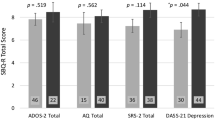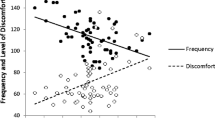Abstract
Persistent depression has been suggested to be associated with autistic traits in people of working age. This study aimed to clarify which autistic characteristics at the initial visit were associated with persistent depression at the 12 week follow-up in a primary care setting. Newly depressed outpatients aged 24–59 years with no history of autism were asked to complete the 50-item autism spectrum quotient (AQ) and the Beck depression inventory (BDI) at baseline and 12 week follow-up (N = 123, males: 48%, age: 37.7 ± 9.15 years). Nearly 40% of participants had an AQ score ≥ 26. Significant differences were observed between the group with remitted depression (N = 43) and those with persistent depression (N = 80) in educational years and AQ “attention switching” and “attention to detail” subscale scores. In addition, a statistically significant decrease in the total AQ and the “communication” and “imagination” scores were observed in the remitted group, while no such change was observed in the group with persistent depression. It remains unclear whether the self-perceived severity of communication and imagination traits in persistent depression was due to the state of persistent depression or a kind of premorbid autistic trait. The results suggest that high levels of autistic traits are frequently present in adults with depression. High “attention switching” and “attention to detail” scores in AQ screening at the first visit might predict the persistence of depressive symptoms after 12 weeks in adults with depression, while total AQ scores, especially for “communication” and “imagination” items, might be state-dependent.
Similar content being viewed by others
References
Kyu HH, Abate D, Abate KH, Abay SM, Abbafati C, Abbasi N et al (2018) Global, regional, and national disability-adjusted life-years (dalys) for 359 diseases and injuries and healthy life expectancy (hale) for 195 countries and territories, 1990–2017: a systematic analysis for the global burden of disease study 2017. The Lancet 392:1859–1922. https://doi.org/10.1016/S0140-6736(18)32335-3
Nishi D, Ishikawa H, Kawakami N (2019) Prevalence of mental disorders and mental health service use in Japan. Psychiatry Clin Neurosci 73:458–465. https://doi.org/10.1111/pcn.12894
Ley P, Helbig-Lang S, Czilwik S, Lang T, Worlitz A, Brücher K et al (2011) Phenomenological differences between acute and chronic forms of major depression in inpatients. Nord J Psychiatry 65:330–337. https://doi.org/10.3109/08039488.2011.552121
Geurts HM, Jansen MD (2012) A retrospective chart study: the pathway to a diagnosis for adults referred for ASD assessment. Autism 16:299–305. https://doi.org/10.1177/1362361311421775
Radtke M, Wieczoreková D, Normann C, Humpolicek P, Brakemeier E-L, Bubl E et al (2019) Exploring autistic traits in adults with chronic depression: a clinical study. Res Autism Spectr Disord 65:34–45. https://doi.org/10.1016/j.rasd.2019.04.006
Ghaziuddin M, Ghaziuddin N, Greden J (2002) Depression in persons with autism: implications for research and clinical care. J Autism Dev Disord 32:299–306. https://doi.org/10.1023/A:1016330802348
Joshi G, Wozniak J, Petty C, Martelon MK, Fried R, Bolfek A et al (2013) Psychiatric comorbidity and functioning in a clinically referred population of adults with autism spectrum disorders: a comparative study. J Autism Dev Disord 43:1314–1325. https://doi.org/10.1007/s10803-012-1679-5
Takara K, Kondo T (2014) Comorbid atypical autistic traits as a potential risk factor for suicide attempts among adult depressed patients: a case–control study. Ann Gen Psychiatry 13:33. https://doi.org/10.1186/s12991-014-0033-z
Baron-Cohen S, Wheelwright S, Skinner R, Martin J, Clubley E (2001) The autism-spectrum quotient (AQ): evidence from Asperger syndrome/high-functioning autism, males and females, scientists and mathematicians. J Autism Dev Disord 31:5–17. https://doi.org/10.1023/a:1005653411471
Ashwood KL, Gillan N, Horder J, Hayward H, Woodhouse E, McEwen FS et al (2016) Predicting the diagnosis of autism in adults using the autism-spectrum quotient (AQ) questionnaire. Psychol Med 46:2595–2604. https://doi.org/10.1017/s0033291716001082
Beck AT, Ward CH, Mendelson M, Mock J, Erbaugh J (1961) An inventory for measuring depression. Arch Gen Psychiatry 4:561–571. https://doi.org/10.1001/archpsyc.1961.01710120031004
Riedel M, Moller HJ, Obermeier M, Schennach-Wolff R, Bauer M, Adli M et al (2010) Response and remission criteria in major depression–a validation of current practice. J Psychiatr Res 44:1063–1068. https://doi.org/10.1016/j.jpsychires.2010.03.006
Woodbury-Smith MR, Robinson J, Wheelwright S, Baron-Cohen S (2005) Screening adults for asperger syndrome using the aq: a preliminary study of its diagnostic validity in clinical practice. J Autism Dev Disord 35:331–335. https://doi.org/10.1007/s10803-005-3300-7
Wakabayashi A, Tojo Y, Baron-Cohen S, Wheelwright S (2004) The autism-spectrum quotient (AQ) Japanese version: evidence from high-functioning clinical group and normal adults. Shinrigaku Kenkyu 75:78–84. https://doi.org/10.4992/jjpsy.75.78
R Core Team (2020) R: a language and environment for statistical computing vienna, austria. URL https://www.R-project.Org/. Accessed 2 Oct 2020
Richards G, Kenny R, Griffiths S, Allison C, Mosse D, Holt R et al (2019) Autistic traits in adults who have attempted suicide. Mol Autism 10:26. https://doi.org/10.1186/s13229-019-0274-4
Bromet E, Andrade LH, Hwang I, Sampson NA, Alonso J, De Girolamo G et al (2011) Cross-national epidemiology of dsm-iv major depressive episode. BMC Med 9:90. https://doi.org/10.1186/1741-7015-9-90
Peyrot WJ, Lee SH, Milaneschi Y, Abdellaoui A, Byrne EM, Esko T et al (2015) The association between lower educational attainment and depression owing to shared genetic effects? Results in ~25 000 subjects. Mol Psychiatry 20:735–743. https://doi.org/10.1038/mp.2015.50
Wakabayashi A, Baron-Cohen S, Wheelwright S, Tojo Y (2006) The autism-spectrum quotient (aq) in japan: a cross-cultural comparison. J Autism Dev Disord 36:263–270. https://doi.org/10.1007/s10803-005-0061-2
Idring S, Lundberg M, Sturm H, Dalman C, Gumpert C, Rai D et al (2015) Changes in prevalence of autism spectrum disorders in 2001–2011: findings from the stockholm youth cohort. J Autism Dev Disord 45:1766–1773. https://doi.org/10.1007/s10803-014-2336-y
Brugha TS, Spiers N, Bankart J, Cooper S-A, McManus S, Scott FJ et al (2016) Epidemiology of autism in adults across age groups and ability levels. Br J Psychiatry 209:498–503. https://doi.org/10.1192/bjp.bp.115.174649
Billeci L, Calderoni S, Conti E, Gesi C, Carmassi C, Dell’Osso L et al (2016) The broad autism (endo)phenotype: neurostructural and neurofunctional correlates in parents of individuals with autism spectrum disorders. Front Neurosci 10:346. https://doi.org/10.3389/fnins.2016.00346
Kato TA, Shinfuku N, Fujisawa D, Tateno M, Ishida T, Akiyama T et al (2011) Introducing the concept of modern depression in japan; an international case vignette survey. J Affect Disord 135:66–76. https://doi.org/10.1016/j.jad.2011.06.030
Kato TA, Kanba S (2017) Modern-type depression as an “adjustment” disorder in japan: the intersection of collectivistic society encountering an individualistic performance-based system. Am J Psychiatry 174:1051–1053. https://doi.org/10.1176/appi.ajp.2017.17010059
Sheehan DV, Lecrubier Y, Sheehan KH, Amorim P, Janavs J, Weiller E et al (1998) The mini-international neuropsychiatric interview (M.I.N.I.): the development and validation of a structured diagnostic psychiatric interview for DSM-IV and ICD-10. J Clin Psychiatry 59:22–33 (Suppl 20, quiz 34-57)
First MB, Williams JBW, Karg RS, Spitzer RL (2016) User’s guide for the SCID-5-CV structured clinical interview for DSM-5® disorders: clinical version. Artmed, Porto Alegre
Domes G, Spenthof I, Radtke M, Isaksson A, Normann C, Heinrichs M (2016) Autistic traits and empathy in chronic vs episodic depression. J Affect Disord 195:144–147. https://doi.org/10.1016/j.jad.2016.02.006
Acknowledgements
We are grateful to all participants for contributing their time to this study. We would like to express our gratitude to all the staff of the Hidamari Kokoro clinic for their cooperation in collecting questionnaires. This work was supported by JSPS KAKENHI Grant Number JP19K08071 and JP20K16625; Mental Health Okamoto Research Foundation.
Author information
Authors and Affiliations
Contributions
KI and NN conceived of the study idea and design. Testing and data collection were conducted by KI, TI, and NN. KI and TI performed the analysis, drafted the paper and all authors provided critical revisions. All authors approved the final version of the paper.
Corresponding author
Ethics declarations
Conflict of interest
The authors declare no conflict of interest.
Rights and permissions
About this article
Cite this article
Ishizuka, K., Ishiguro, T., Nomura, N. et al. Autistic traits as predictors of persistent depression. Eur Arch Psychiatry Clin Neurosci 272, 211–216 (2022). https://doi.org/10.1007/s00406-021-01292-6
Received:
Accepted:
Published:
Issue Date:
DOI: https://doi.org/10.1007/s00406-021-01292-6




